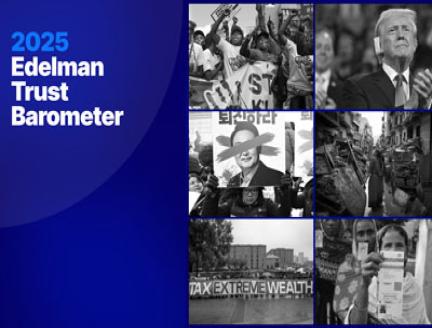Employees need more than just a way to pay the bills. They need an organisation that shares their personal values, impacts society, and ultimately enhances their lives and the lives of those around them. And as businesses start to realise that their success lies foremost in their employees, the ‘world of work’ needs to evolve into something more holistic.
These are just some of the findings in Edelman’s Trust Barometer Special Report, The Belief-Driven Employee, following a survey of thousands of employees and employers in 7 markets across the world.
In a partnered seminar, experts from Edelman South Africa, Wits Business School and the private sector unpacked the report, examining how this new research relates to the South African context.
The research revealed that employees are now the most important stakeholder in a company’s long-term success, surpassing customers and shareholders. But ensuring employee commitment, retention, and advocacy now requires both sides to share values.
Trust in employers is at a record high globally, the research shows, meaning business is more trusted than governments, media and NGOs – bringing about new expectations that employers do more purpose-filled work in exchange for this added loyalty.
But what about the South African context? Are local employees more likely to be more driven by their beliefs in SA?
They are, according to Dr Manamela Matshabaphala, Senior Lecturer at the Wits Graduate School of Business Administration, as the international research does correlate to employee behaviours locally.
The highest performing companies with the highest level of employee retention, he said, were able to provide the best possible products and services by focusing on people and ensuring the ‘world of work’ was a better place for those operating in their organisations.
“This is achieved through the kind of environment they create for their employees, also showing their sensitivity to the eco-system within which the company operates, paying attention to the career advancement of their employees and overall employee wellness,” he said.
Dr Matshabaphala said that it all boiled down to one key leadership behaviour – making employees feel special and meeting their unique needs. When this happens, the behaviour spreads to the consumers they serve.
The report also highlighted that companies failing to take a stand on social issues struggle to retain their best employees, as employee activism levels skyrocket across the world.
Workplace activism is now the norm, with 76% of people polled saying they would take action to motivate or pursue necessary organisational change. Companies that push for social impact are rewarded, as these activistic, belief driven employees are more loyal, committed to the work and ultimately want the organisation to succeed. 79% of employees who believed in their companies’ values were likely to recommend their companies’ products and services, and 76% recommended their organisation as an employer to others. The power balance has shifted to employees, 60% of whom believe they have more power and leverage in creating change within an organisation for the better.
While these changes encompass social impact, employee rights and fair compensation, what has also become essential for these sought-after employees is balance.
Kgomotso Moalusi, Head of Advisory and Lead for Employee Engagement at Edelman Africa, noted that the research had an important focus on anxiety levels and burnout experienced by working people due to the pandemic.
“The pandemic has shifted work/life boundaries, and burnout is now a bottom-line issue – and if it’s not addressed it can result in valuable employees leaving an organisation,” she said.
62% of those polled said they had increased their value to their employer by taking on more work and responsibility over the course of the COVID-19 pandemic, and among those who feel
that their employer isn’t addressing burnout, 25% have quit, or will quit their job in the next six months.
Addressing all these complex belief-driven employee concerns, requires a new Employer-Employee Compact with four focal points, the report recommends.
-
Employees first
Consumers, investors and employees all agree that employees are now your most important—and influential—stakeholder. Meeting their expectations brings advocacy and loyalty. Employers who don’t, risk disruptive activism and higher turnover.
-
Share the power
Employees know they now hold more power and want more participation. Practice bottom-up strategy planning to create more involvement.
-
Take a stand
Greater social impact is a strong expectation for the majority of job seekers. Center your business strategy and employer brand around your commitments on critical social issues such as healthcare, the environment and DEI (Diversity, Equity and Inclusion).
-
Upskill your workforce
A broader societal remit doesn’t relieve employers from the urgent need to train workers for the jobs of the future. Enabling workers to thrive in the age of automation and AI is a competitive advantage and builds employee trust.




